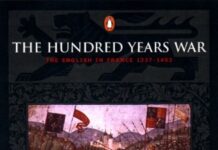
Ebook Info
- Published: 2020
- Number of pages: 306 pages
- Format: PDF
- File Size: 2.90 MB
- Authors: Desmond Seward
Description
In this startling reassessment of one of England’s hero kings Desmond Seward gives a portrait very different from Shakespeare’s Henry V.The cold young military genius who emerges imposed an occupation of north-western France that in some ways harked back to the Norman conquest of England, in others anticipated the Nazis in World War II – with the difference that the English occupation of Paris lasted for seventeen years. The author claims that few western kings have been personally responsible for more bloodshed – Henry’s troops committed atrocities never entirely forgotten by the French people in the regions that were under his control.Henry’s father had usurped the crown, deposing and murdering Richard II and setting aside the heir. Henry based his own claim to the throne of France on a female descent and in Henry V as Warlord, Desmond Seward argues that the dubious claims to both thrones cast a good deal of light on the king’s psychology; something that has never received sufficient attention.Praise for Henry V as Warlord:‘[T]his portray[al] … is the exact opposite of the “classical” view painted by William Shakespeare, in particular. It is, however, a much more realistic one, and it is for this and for its depiction of war in France in the early fifteenth century, that this book is worth five stars’ – Amazon reviewDesmond Seward was born in Paris of a Franco-Irish family who have been wine merchants at Bordeaux since the 1860s, and has many relatives throughout north-western France, where Henry V campaigned. He is the author of many popular history books, including The Hundred Years’ War and The Demon’s Brood. Educated at Ampleforth and at St Catharine’s College, Cambridge, where he was an Exhibitioner in History, he lives in Brighton.
User’s Reviews
Reviews from Amazon users which were colected at the time this book was published on the website:
⭐Henry V was one of the most ferocious of England’s kings. Through sheer force of will alone he was able to quell his English nobility into following him, and then turn to the French and do the same to them.Seward does a great job in using the contemporary sources of the time to illustate who the man really was, all the meanwhile not falling prey to the trappings of the propoganda of the time. His illustration of the man’s short life is invaluable to anyone reading French or English history, but especially for anyone who is looking for information on the Hundred Years War.A must read for history buffs.
⭐This is an excellent book that concentrates on Henry V’s military achievements. At the outset, and to avoid any misunderstanding, it should be clear that this book is about Henry the warlord, as its title makes out so clearly. It is a military history. It is not the history of the reign of Henry V and neither is it the biography of the man. It should therefore be assessed for what it intended to be and not for what it could have been or what some reviewers may have wanted it to be.One reviewer on Amazon.co.uk mentioned that Henry V “in this book is portrayed as a cruel, arrogant, humourless religious bigot” and I fully agree with such a description. Had he not been cruel and arrogant – the previous reviewer could also have said ruthless – the chances are that he would not have stayed on the throne that he occupied after his father, who had usurped it. Anyway, in the Middle Ages, “nice” Kings, assuming there were any, did not survive for long. Being “nice” was not part of the job description.Had Henry been “nice”, he would also not have been so successful in both battles and sieges. He certainly did order what would be nowadays seen as atrocities, including during the siege at Rouen where he refused to let the “useless mouths” ejected from the city through his lines, preferring to let them starve. He burnt, pillaged and killed his way through Normandy and marched up to Calais but got caught be the French army before he managed to reach it and was forced to fight the battle of Azincourt. Towards the end of the battle, he ordered hundreds of French prisoners executed. All of this is perfectly true, and more besides.This, however, was war during the Middle Ages. There were no “niceties” such as Geneva Conventions, war crimes or human rights. If by chance you were captured, your life depended on how much money could be extracted from your relatives as a ransom. However, having hundreds of captives behind your lines with the battle was not yet won and your forces being hard pressed by the still more numerous enemy could indeed explain the decision to kill them. A good warlord just about to win a rather incredible victory against all odds would be somewhat unlikely to risk the outcome of the battle, all of his army and his own life just to spare human lives of captives, even noble lords. A similar explanation applies to Henry’s ruthlessness during Henry’s sieges, and at Rouen in particular: letting the starving civilians through would have encouraged the city’s garrison to throw more of them out and allowed them to hold out longer. This is something that Henry could simply not afford because every extra day spent besieging Rouen was one day more given to the much larger French army to gather and attempt to relieve the city. So, he was certainly ruthless and cruel, and for good reason, but then all warlords were at the time, but none were as effective as he was at the time.A related point that many may not have appreciated and which the book clearly explains is that Henry, prior to his victorious campaigns in France, was comparatively weak and insecure when he came to the throne. He was the son of an usurper and others had a better claim than his to the crown of England. At the time, a victorious king was seen as being favoured by God so if he won, his throne would be assured. At the time also, England was both less populated and poorer than the Kingdom of France. So he needed to prove himself to his own nobles and people. He needed to fill up his coffers and he needed a successful expedition to France to achieve all that. It is unlikely that he expected to win at Azincourt and in fact he did everything he could to avoid having to fight the battle since the odds were so much against him: his army was less than half the size of the French and it was tired after a long and hard campaign and a hard march North to escape the French who had – at last – arrived. It is even unlikely that he had initially planned to reconquer all of Normandy, but the inept and divided French command’s slow reaction gave him this opportunity and he took it immediately. Even after Azincourt, he should not have been able to take Paris, but the catastrophic mistake made by Charles, the heir to the throne, who had Jean Sans Peur Duke of Burgundy assassinated, drove the Burgundians into his arms and it is thanks to them that Paris fell. Again, as a commander and a warlord, he was quick to take advantage of the enemies mistakes, and the French were rather obliging in this respect.From a position of initial weakness, he managed to get himself crowned King of France. It is this weakness and the tremendous and almost incredible successes that followed that explain both his arrogance and what another reviewer has termed his bigotry. The successes were such that they could indeed appear as nothing short of miraculous, seen from an English perspective, of course (and just like the successes of Joan of Arc would seem miraculous a few years latter). For the French, these were huge disasters which were partly of their own making and partly because Henry, the enemy commander was a driven and very competent soldier that had a lot to prove and who was playing for extremely high stakes.So this portray, as others have already mentioned, is the exact opposite of the “classical” view painted by William Shakespeare, in particular. It is, however, a much more realistic one, and it is for this and for its depiction of war in France in the early fifteenth century, that this book is worth five stars.
⭐I must admit that I bought into the picture of Henry painted by Shakespeare. Few, if any of the books, that I have read about Henry and the warfare that he inaugurated suggested otherwise. One more thing: I am a history major and taught it for many years. This book gives a completely different slant on the Anglo-French war, and insists on including what happened to the ordinary French people of the day. The ground-breaking book by Martines “Furies: War in Europe 1450-1700” confirms the horrible price paid for the “glory” and “honor” of European monarchs. It also helps to explain the deep antipathy between England and France that stretched into the 20th century and to some extent still lingers. Henry V was a gifted leader and came close to his goal of uniting England and France. Could he have pulled it off had he lived? Seward thinks not. I will leave that conclusion up to other historians as to its validity. The book is an easy read and it does not take a degree in history to follow it closely. So I do highly recommend it and I can see that I will need to read up on this particular era, this time from the French side.
⭐Shakespeare’s Henry V forms the basis for most people’s impression of this monarch. This remarkably effective piece of propaganda presents Henry as an inexperienced and brave young man with a number of attractive features. In this fine book, Desmond Seward presents a realistic picture of Henry V that is quite different from the Henry in Shakespeare. While Henry came to the throne at a young age, he was already an experienced commander and administrator. His skills had been developed in the rather vicious politics of contemporary England and by the leading role he played in subduing rebellion in Wales. Based on a careful reading of sources and his extensive knowledge of Medieval Europe, Seward presents Henry as an unusually capable and ruthless leader bent on consolidating royal authority in England and conquering France. Seward’s well justified analysis of Henry’s motivations are based on Henry’s insecurity over his claim to the throne, which had been usurped by his father. Seward infers that the undoubtedly pious Henry regarded his attempt to conquer France as a trial by God over the issue of the legitimacy of his crown. Henry’s successes then were sanction of his efforts to conquer France and his right to occupy the throne of England. This book provides fine narrative of Henry’s life as a soldier and campaigner. Seward’s descriptions of Medieval warfare and politics are excellent. He addresses well why a small and relatively sparsely populated country like England could do so well in combat against the French. Seward addresses also the question of why the English presence proved to evanescent. My only complaint with this book is that it did not cover other aspects of Henry’s life. This is not entirely fair as Seward aimed at covering Henry’s life as a attempted conquerer and he achieves his aims easily. This is not an attempt at a comprehensive biography. Seward’s intelligent treatment of these aspects of Henry’s life makes me wish he had attempted a broader book.
⭐Everybody knows something of the life of Henry V and that’s probably down to William Shakespeare andSir Laurence Olivier, his reign has been stylised. This book goes further than that, thrusts off the myth and tells of the aftermath of that battle, it’s consequences and subsequent battles. A fascinating read.
⭐A very informative read, which fully showed the barbaric nature of 15th century warfare
⭐Verry whell written and hihgly recomendabel account.
⭐well written a good read. extremely comprehensive, details not read elsewhere and information from other books very appropriate. would recommend it for history readers.
⭐I knew nothing of Henry V before and this book brought to life many places I have visited.
Keywords
Free Download Henry V as Warlord in PDF format
Henry V as Warlord PDF Free Download
Download Henry V as Warlord 2020 PDF Free
Henry V as Warlord 2020 PDF Free Download
Download Henry V as Warlord PDF
Free Download Ebook Henry V as Warlord





